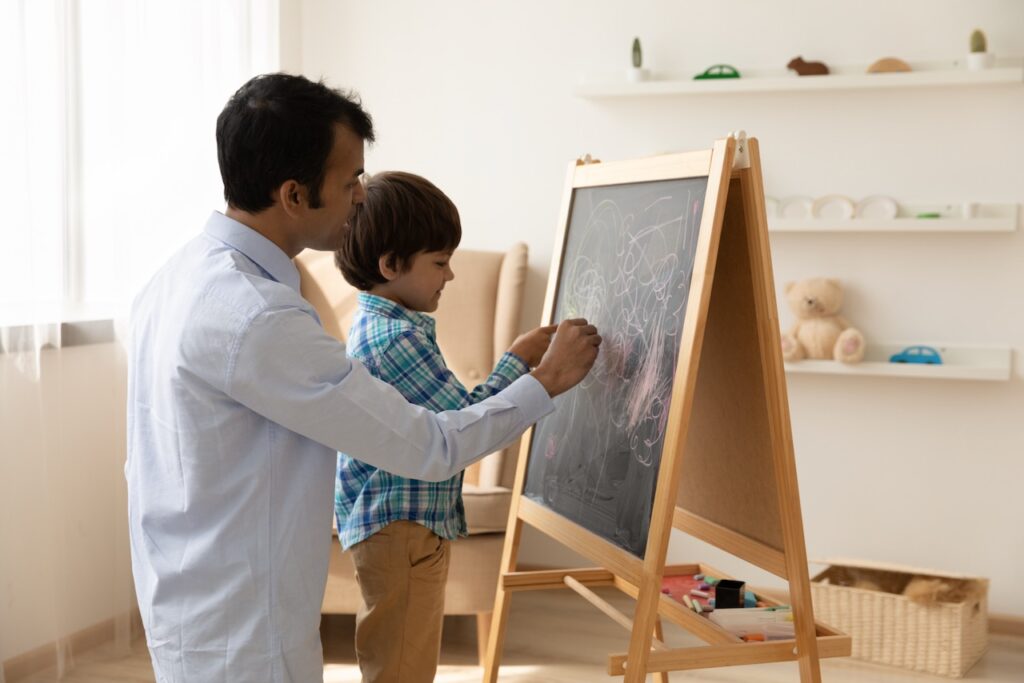
Young children are still at the beginning of their physical and mental development. They have a lot to learn and important skills to acquire. To do this, they need the support of their parents and the educational staff. It is difficult to make up for lost time later. If you want to support your children, there are various options open to you.
Early childhood development is crucial for the whole of later life. What boys and girls don't learn now, they miss later in life. Even at preschool age, it pays to train the brain and motor skills. Certain movement patterns are already imprinted throughout life. These include Example the movements during swimming and cycling.
The more your child learns at an early age, the greater his or her store of knowledge. The knowledge and skills acquired form the basis for subsequent learning successes. The child feels his way up the ladder step by step and continues to develop. If rungs are missing in the ladder, then it is difficult to overcome the hurdles. In the worst case, your child will fall behind in development.
If you want to support your children, it is important to include all areas. Your child needs age-appropriate support on a cognitive, physical, emotional and social basis.
Encouraging children means encouraging them to think independently. You motivate them to find solutions and recognize logical connections. Early cognitive development is important for learning to read and write later and for understanding mathematical processes.
Encouraging children also means advancing their physical development. Only boys and girls who get plenty of exercise appropriate to their age build up sufficient muscles and form a healthy joint and skeletal system. Exercise has a positive influence on the entire organism. The lungs fill with oxygen and the cardiovascular system keeps going.
It is important to support children emotionally. They learn to express their Accepting feelings and dealing with them properly. This strengthens self-confidence and makes it easier to deal with defeats.
If you want your offspring to get along well with other people and find their place in society, you need to encourage them accordingly. The best way to do this is through contact with peers, for example on the playground or in kindergarten.

Supporting children is always the primary responsibility of parents. They are the ones who set the course at an early age and later provide parental support at school. Extracurricular activities are enormously important for the child's development. If you leave the support work solely to the education system, you're getting too comfortable and hurting your child. There are smart strategies you can use to support your children.
Read to your children as much as possible and motivate them to pick up a book themselves later. Reading strengthens language development and expands vocabulary. Children who read often make fewer spelling and grammar mistakes. Likewise, it is self-explanatory that children who can read well find their way around the world better.
When children paint, they process their feelings and experiment with shapes and colors. This stimulates the imagination and supports the power of imagination. By expressing themselves, children develop more self-confidence. In addition, using a pencil and brush promotes fine motor skills and eye-hand coordination.
Playing musical instruments also serves creative self-realization. The child develops its own rhythms or learns to play common melodies independently. This promotes concentration, imagination and hearing. In addition, learning a musical instrument requires discipline and perseverance. Accepting criticism and celebrating successes contributes to the emotional development at.
As already mentioned, sport promotes the healthy physical Child development. The boys and girls gain body control and mobility. They learn to coordinate movement sequences and intercept falls. This reduces the risk of injury. Physical fitness grows with the training.
Team games, for example soccer and handball, promote the ability to work in a team and thus create important prerequisites for later professional integration. The children learn to show consideration for one another, to resolve conflicts and to interact successfully with one another. They develop important social skillswhich also offers them membership in various clubs. Children's and youth groups exist, for example, in small animal breeding, nature conservation, fishing and sports clubs.
Spending time outdoors is healthy and promotes well-being. In addition, there is much to discover outside. Children learn to look at their environment with alert eyes and gather valuable information about the local flora and fauna. Outdoors, sporting activity can be wonderfully combined with cognitive and emotional development.
Very important for child development are trips to the playground. The playground equipment is designed to provide a minimum level of safety and at the same time allow for age-appropriate development. Children learn to coordinate their movements and train their sense of balance by finding the right balance. In addition, the youngsters acquire social skills through interaction with other children.
Building blocks, dolls and miniature landscapes encourage children to play imaginatively. They acquire valuable motor skills and develop their own initiative. In addition, board and card games promote the ability to concentrate and combine. They teach the child tactical thinking and give him a sense of logic.
There are professionals at work in the school in the form of educational specialists. They know exactly how to convey complex learning content in the simplest way possible. The education system therefore plays a major role in the cognitive development. The transfer of knowledge at school is not magic, but the result of targeted learning support.
Most information sticks in long-term memory only after repeated repetition. Teachers are aware of this and use yet another effective strategy. They create a basic understanding of the subject matter. Nowadays, experimentation takes a firm place in the classroom routine. Instead of stubborn memorization, a method takes hold that enables the children to transfer the knowledge they have acquired to other situations.

The education system provides children with basic skills. Extracurricular activities help to deepen the knowledge acquired at school. Children who exercise regularly in their free time often shine with good sports grades. Those who play an instrument at home do better in music lessons and may be able to develop their skills further in the school orchestra. The same applies to the arts.
This type of extracurricular support is particularly effective because it is provided on a voluntary basis without coercion. Supporting children must be fun for everyone involved make. Only then is it possible to awaken hidden talents and further develop existing interests. If the child can use his or her personal skills profitably in the classroom, then he or she usually has a positive relationship to school and learning in general.
Encouraging children brings long-term benefits. Neglecting them has far-reaching consequences. In the most harmless case, the child falls short of his or her abilities. It cannot fully exploit its existing talents and persists in a lower Development stage. Such children have the potential for more, but still attend a school that does not correspond to their actual level. With targeted support, they could achieve much more.
One of the worst consequences is permanent retardation in development. If the children do not receive any support, they do not acquire the essential skills. They are then hardly able to master the challenges of life. They are mentally and physically underdeveloped, cannot articulate sufficiently, read and write inadequately, and have difficulty integrating into working life.
Every child is equipped with different facilities. For some, learning is easy, they grasp contexts quickly and are much further along than other children within a short time. The fatal thing is that it is precisely the exceptionally talented boys and girls who receive even more support, while all the others fall by the wayside. It is important to pick up all children where they are and develop them according to their potential. You can't leave anyone behind, especially if you work as an educator in the education system.
Encouraging children works best when the boys and girls enjoy what they are doing and are happy to participate of their own free will. Patience is important. You must not overtax the children and prefer short and intensive units rather than long and tiring learning intervals. The little ones learn best through play. If the children develop an aversion to learning, this often persists in the long term.
Do you want to support children in the best possible way? In this free e-book you'll learn how a child can successfully navigate the school years with less learning and more enjoyment. The learning expert Markus Hofmann shows you ten tried-and-tested tips that will help you give children the best possible support in their learning.

